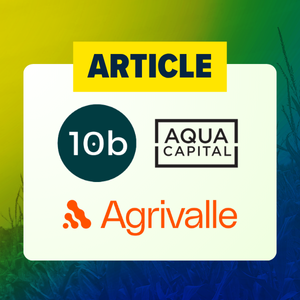As global agtech investment cools and capital becomes more cautious, biological inputs continue to outperform expectations. Countries like Brazil offer a perfect storm of agronomic demand, deep innovation , and regulatory alignment, positioning the country - and South America more broadly, - as a global hotspot for biologicals. While other segments struggle with scalability and margins, biologicals are gaining traction across the entire value chain, backed by strong farmer adoption and increasing institutional confidence. Ahead of the World Agri-Tech South America Summit in São Paulo (June 24–25), leading investors and operators are raving about the region’s uniquely fertile ground for biological innovation and commercial growth.
Brazil: The World’s Biologicals Testbed
“Brazil leads globally in biologicals,” says Tomas Romero, Partner at Aqua Capital. This is due to benefitting from “strong R&D, a wide talent pool of skilled agronomists, and high input intensity in farming - Brazil sees two to three times more expenditure in ag inputs per acre than the U.S. or Europe.” Brazil lends itself to trailing biologicals due to its size and complexity. “Its large, competitive market, supportive regulation, and fast-paced innovation make it a global testbed for agtech,” Romero explains. Marcelo Lima, Co-Founder of Agrivalle and 10B Gestora de Recursos, agrees that Brazil’s unique agricultural profile creates the perfect storm for biological adoption. “As one of the world’s largest agricultural markets and a tropical climate zone, it faces high pest pressure, accelerating the adoption of biological solutions.”
Playing The Long Game
As with any change to an established practice, biologicals adoption and success has been a gradual change, not a quick fix. For Aqua Capital, it took "over 15 years of sector-focused investment experience" to get to their position today, with a number of high-quality biologicals companies in their portfolio. Tomas shares the importance of this R&D for "driving innovation and delivering unique solutions that meet real agronomic and commercial needs.” Similarly, Marcelo Lima noticed this shift early and built Agrivalle "on the belief that biologicals would move from niche to mainstream as agriculture demands more sustainable, high-performance inputs.” This early conviction means today the company has a high-quality portfolio spanning all major crops.
ROI, Not Just ESG
While sustainability is a long-term driver for the industry, growers care about ROI. “Biologicals must fit seamlessly into growers’ systems and deliver strong returns, typically 2x ROIC, to drive adoption,” says Romero. “They offer sustainable, science-backed solutions that enhance soil health and long-term productivity in ways chemical inputs often cannot. But product performance can vary, education gaps persist, and distribution infrastructure is still maturing.” So not only is product R&D important, so is research and investment into "go-to-market capabilities, demand generation, and farmer training," to ensure reliable performance and practical deployment.
Proven Efficacy Is the Tipping Point
“Research shows that adoption at the farm is mainly driven by product efficacy, not sustainability,” says Lima. In order to prove this efficacy but also overcome challenges of farmer education, he suggests a "diversified go-to-market strategy" coupled with "strategic B2B partnerships with companies with strong farmer relationships and established market access.”. “These alliances are critical to scaling impact efficiently and sustainably,” he adds.
Tropical Technology with Global Reach
Brazil’s biological sector isn’t just big, it’s exporting innovation. “Technologies developed here, under demanding tropical conditions, are increasingly exported to Africa, Asia, and North America,” says Romero. He notes the rapid pace of domestic growth: “Biologicals are at the forefront, growing over 30% annually in Brazil over the past five years, with strong prospects across South America.” It’s this scale, speed, and scientific depth that makes South America “a natural springboard for global biological innovation.”
Brazil’s Role in Feeding 10 Billion
Marcelo Lima highlights Brazil’s somewhat untapped potential as a cornerstone of global food security. “To feed a growing global population, expected to reach 10 billion by 2055, Brazil should be the main contributor to additional food production, since it can more than double its crop area sustainably through pasture conversion.” This context makes biologicals not just a nice-to-have but a necessity. “Brazil is already the fastest-growing market globally, yet biologicals remain underpenetrated relative to total input spend.” And momentum is building. “We see structural tailwinds: rising farmer demand, regulatory momentum, and a vibrant innovation ecosystem.”
Conclusion: It’s Only Up From Here
What’s emerging in Brazil is more than just a market trend, it’s a structural transformation of agricultural input systems. Based in science, backed by capital, and driven by producers under real-world pressure, biologicals are moving from complementary to central in agricultural practice. “This is a rare opportunity for long-term investors to back category leaders in a market poised to define the global future of biologicals.” While much of global agtech is recalibrating, biologicals in South America are scaling, and fast. Join future-focused agtech leaders, innovators and investors at the World Agri-Tech South America Summit on June 24-25 at the Hotel Unique in São Paulo, where discussions will explore the importance of South American agriculture to global food security.
View the full program to see all 100+ speakers, and book now to join them in São Paulo.

)
)
)